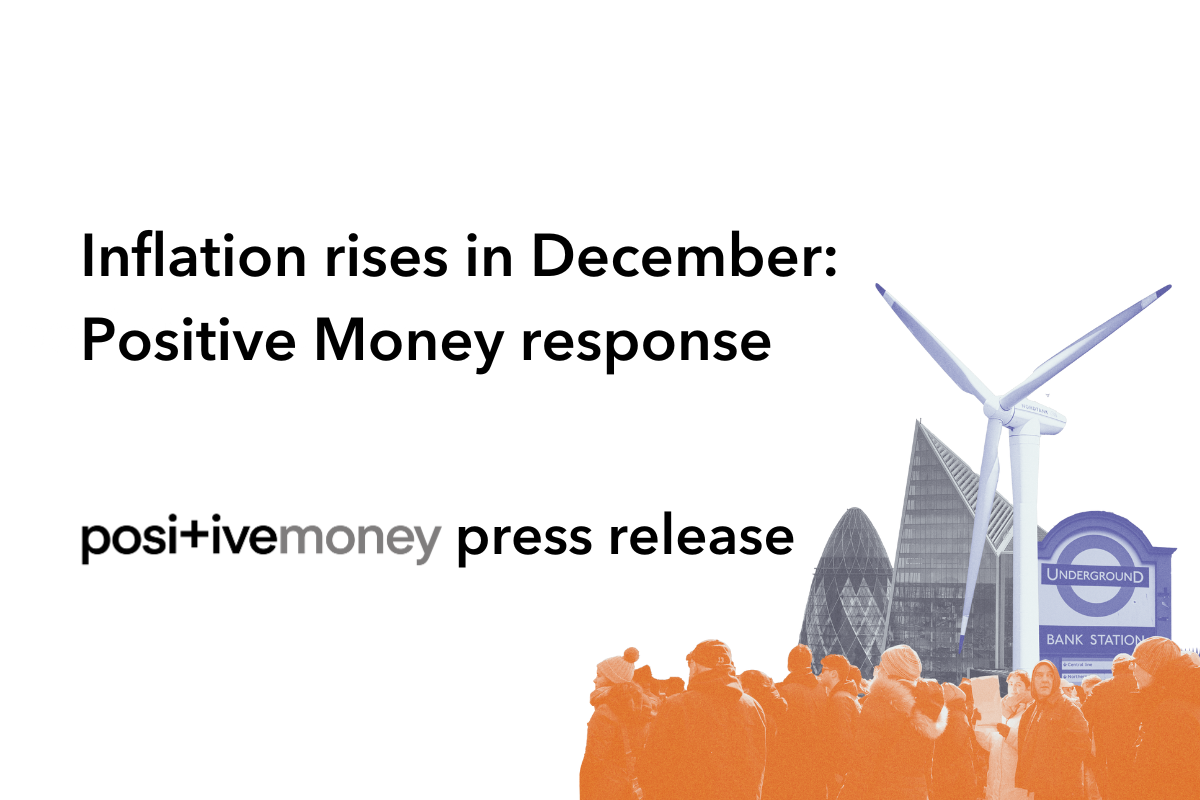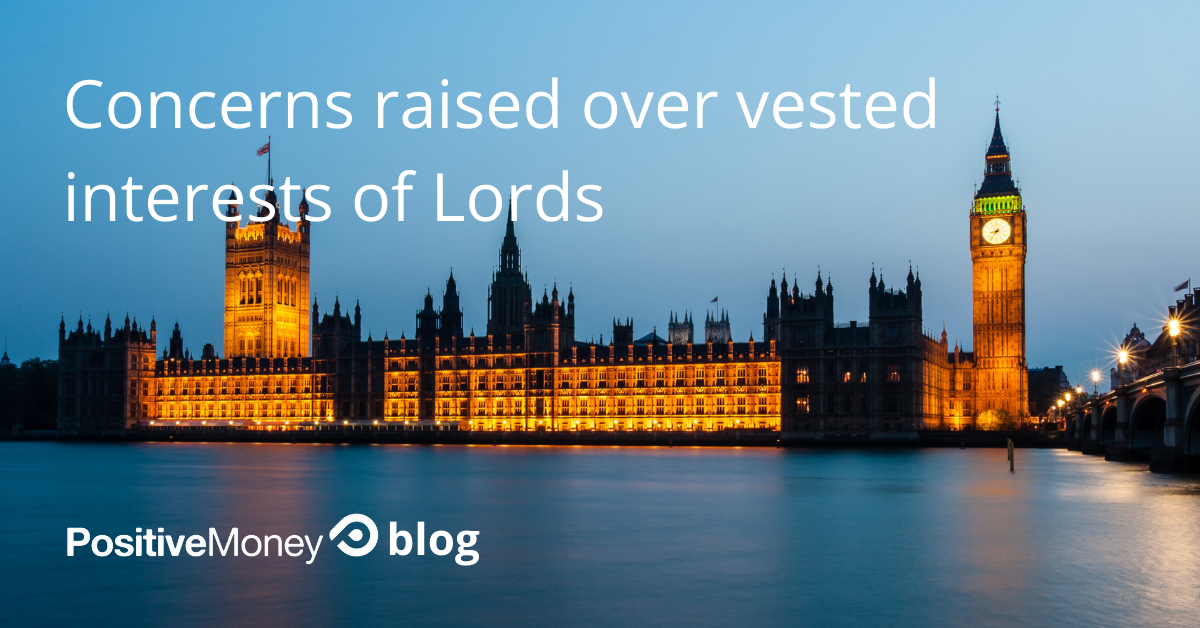
Monetary policy and inequalityUK
21 January 2026
London, Thursday 19th January 2023
All Peers voicing support for measures to deregulate the City have ties to financial services
Debate over the government’s new financial services legislation in the House of Lords has been dominated by Peers with vested interests in deregulation, according to new analysis from non-profit research and campaign group Positive Money.
Of the 45 Peers who spoke at the second reading of the Financial Services and Markets Bill in the House of Lords last week, 29 had links to the finance sector, having either received payment from the industry while a member of the House of Lords, or having previously worked for a financial firm.
Most strikingly, of the 15 backbench Peers who voiced explicit support towards the government’s proposals to give regulators a new objective to increase the ‘competitiveness’ of the City of London – widely understood as a bid to soften regulation – all have links to financial services.
The controversial Financial Services and Markets Bill seeks to give Britain’s chief financial regulators, the Prudential Regulation Authority and the Financial Conduct Authority, new statutory objectives to increase growth and competitiveness particularly for the financial services sector. There are widespread concerns from experts and civil society that such an objective will lead to a race to the bottom of standards in order to compete with other jurisdictions at the expense of the wider public, with more than 50 leading figures including Sir Vince Cable and Sir John Kay signing a letter warning of such dangers last year.
Peers’ vested interests ranged from being paid for speeches at financial services conferences to holding senior positions at some of the City’s biggest firms.
Among those who voiced their support for a competitiveness objective were Lord Remnant, a director of insurance giant Prudential and chairman of Coutts & Co, which provides banking services for high net worth individuals, as well as Lord Altrincham, who was head of investment banking at Credit Suisse UK in 2007 and is now a non-executive director at Co-operative Bank, as well as a director with significant control of Molton Street Capital, which describes itself as a “boutique investment manager and broker dealer”. Lord Remnant received $308,000 (£252,000) for his position at Prudential in 2021.
Lord Bridges of Headley, a senior adviser to Santander with shares in the company, pushed for a competitiveness objective to be further prioritised as a primary objective for regulators.
Lord Blackwell, a former chairman of Lloyds Bank who still holds shares in the company, welcomed the proposal to add competitiveness to regulators’ objectives, but said he fears “that the Bill does not go far enough to redress the overly burdensome nature of the regulatory system that has built up over the last decade.”
The views of the Lords appear out of step with the public, with polling commissioned by the Finance Innovation Lab last year showing that fewer than one in ten Brits believe financial firms need less regulation, while two-thirds believe that the existing level of regulation needs to be increased or is about right. Separate polling from the Finance Innovation Lab showed that two-thirds of Brits think the proposal for a competitiveness objective is out of touch and elitist.
The findings follow a Positive Money report last year which found that more than a quarter (27%) of Peers had vested financial services interests, with 1 in 5 (20%) of all Peers holding paid positions in the sector.
Simon Youel, head of policy & advocacy at Positive Money, said:
“It should be no surprise that the only people who are enthusiastic about watering down financial regulation are those with links to the City of London. It is a failure of our political system that unelected Lords have the power to influence laws in favour of dangerous deregulation that they stand to benefit from.
“The House of Lords has been filled with unaccountable spokespeople for the City of London who the public have no way of removing, leaving lawmaking open to capture by vested interests. This is a huge obstacle in the way of building a financial system which serves the whole of society.
Marloes Nicholls, head of policy & advocacy at the Finance Innovation Lab, said:
“As regulators, academics, consumer advocates and campaigners have warned, the ‘competitiveness’ objective would require regulators to cheerlead for the finance industry they are supposed to police, even if that damages the wider UK economy.
We should ask serious questions about why any UK politician would support bringing back a measure that contributed to making the financial crash of 2007/08 happen.”
Notes
For a full list of Peers who supported the governments proposals for regulators to have competitiveness objectives, see appendix.
The expert letter warning about the danger of a competitiveness objective can be viewed in full here: https://financeinnovationlab.org/economist-competitiveness-letter/
Further details of Finance Innovation Lab’s polling:
In both cases, the research data is based on a survey carried out by Opinium Research. Total sample size was 2000 UK adults and the fieldwork was carried out in May and August 2022, respectively. The sample was weighted to be politically and nationally representative of all UK adults (aged 18+).
Positive Money’s 2022 report on the influence of big finance over policymaking: https://positivemoney.org/publications/the-power-of-big-finance/
About Positive Money
Positive Money is a research and campaign organisation working towards a money and banking system which supports a fair, democratic and sustainable economy. Set up in the aftermath of the financial crisis, Positive Money is a not-for-profit company funded by charitable trusts and foundations, as well as small donations from its network of over 65,000 supporters. www.positivemoney.org.uk
About Finance Innovation Lab
The Finance Innovation Lab is a UK charity working to build a financial system that serves people and planet – one that’s democratic, sustainable, just and resilient. www.financeinnovationlab.org
Appendix: List of peers who voiced support for a competitiveness objective for financial regulators
Peer
Party
Links to finance sector
Conservative
Senior Adviser, Intercontinental Exchanges Inc (owner of exchanges and clearing houses for financial and commodity markets)
Adviser, Banco Santander SA
Strategic Business Adviser, W1TTY Tech Ltd (fintech start-up)
Strategic advice, The Proof of Trust (tech start up offering contract assurance) (interest ceased 30 April 2022)
Strategic advice, VISA Europe (global payments company)
Conservative
Chairman and non-executive Director, Secure Trust Bank plc
Formerly Vice-chairman Investment Banking Europe and then Deputy Chairman of JPMorgan.
Formerly at Evercore Partners International LLP (investment bank).
Formerly a Director at NBNK Investments PLC
Formerly Director and Chairman of Hyperion Insurance Group
Crossbench
Shareholder, Fidelity National Information Services (which owns Worldpay).
Conservative
Senior Adviser to the Group Executive Chairman, Banco Santander (primarily on Environmental, Social and Governance (ESG) related issues)
Shareholder, Banco Santander
Conservative
In 2022 received payment to speak at:
Institutional Investor conference
Fiera Capital conference
Conservative
Non-executive director, Link Scheme Limited (the ATM scheme which has been pressured by banks to lower interchange fees and undermine access to cash)
Non-executive director, Global Risk Partners Limited (insurance firm)
Conservative
Director, Prudential plc (insurance)
Director, Prudential Corporation Asia Ltd (insurance)
Chairman and director, Coutts & Co (banking for high net worth individuals)
Shareholder, Prudential plc (insurance)
Conservative
Managing director, Marsh Limited (insurance)
Conservative
Non-executive director, Co-operative Bank
Director, with significant control of South Molton Street Capital Limited (“Molton Street Capital LLP is a boutique investment manager and broker dealear with its office headquartered in Mayfair, Central London”)
LLP Designated Member and person with significant control of ESG Corporate Finance LLP (dormant financial advisory consultancy)
Shareholder, Legal & General Group plc (financial services)
Shareholder, Financial Services Capital (investor in financial services companies)
Previously worked for Goldman Sachs
Formerly Head of Investment Banking at Credit Suisse UK
Conservative
Shareholder:
HSBC
Natwest Group
Experian (financial services)
Prudential (insurance)
Legal & General (insurance)
St James’ Place (wealth management)
3i Group (private equity and venture capital)
Lloyds Banking Group
Phoenix Group Holdings (insurance)
Fidelity National Information Services (payment services)
Conservative
Shareholder, Lloyds Banking Group
Shareholder, Urban Logistics REIT (UK real estate investment trust)
Former Chairman of Lloyds Bank
Crossbench
Chairman, Baltic Exchange Council (The Baltic Exchange is the world’s only independent source of maritime market information for the trading and settlement of physical and derivative contracts)
Conservative
Formerly a banker with the First National Bank of Chicago and the Saudi International Bank
Formerly deputy chairman of Gatehouse Bank
Conservative
Consultant for Kernow Asset Management Limited
Formerly a credit analyst at Baring Brothers & Co, investment analyst at Baring Investment Management
Formerly a senior investment manager at Taylor Young Investment, as well as Smith and Williamson Securities
Co-founded Mars Asset Management
Conservative
Director, UK Koyu Corporation (property investments)
Chairman and director, Epic Investment Funds PCC (formerly Stratton Street PCC)
Director, Jade Road Investments Limited (formerly Adamas Finance Asia)
Consultant, Simon Roberston Associates LLP (corporate finance advice)
Consultant, Japan Bank for International Cooperation (the member’s annual earnings for this work fall within the £30,000 – £40,000 band)
Corporate Adviser, Gideon Franklin Limited (corporate finance advisory firm)
###
